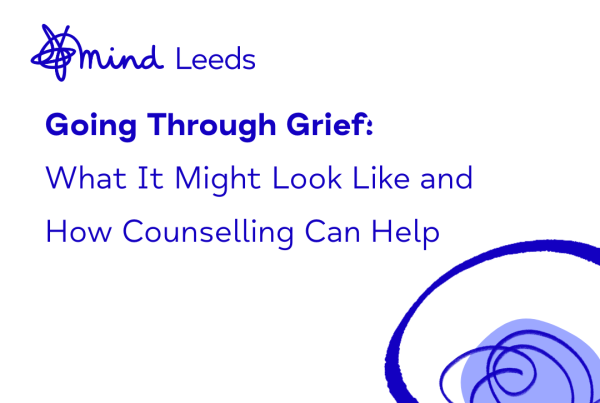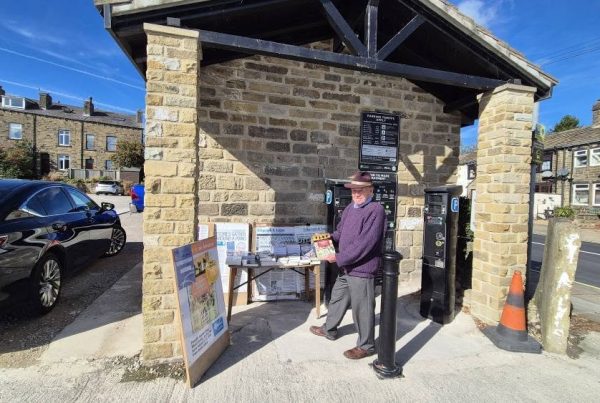Leeds Mindful Employer Network Co-ordinator, Leigh Staunton, chats to network member Relationships Matter, about reducing parental conflict, and how this fits into your workplace wellbeing strategy.
Please tell our network members a bit about you and about the Relationships Matter Project.

Toni Smith, Relationships Matter Project Coordinator
Hi everyone, my name is Toni Smith and I have been an employee of Leeds City Council for over 10 years. I have worked in restorative and relational-based practices with families in a range of settings and circumstances for over 25 years. At the moment I’m working on Relationships Matter – this is the local name for a national ambition to reduce parental conflict (that’s ‘arguing’ to you and me!) This project was borne from research initially conducted by the Department for Work and Pensions (DWP) on the impact of worklessness on couple relationships.
The research uncovered some of what we already know: most couples argue and most couples argue when they become stressed, arguing is part of our relationship journey….and those arguments can be over the smallest of things! The interesting part of the findings relate to our understanding of relationship quality and the impact that poor relationships have on children. Research suggests that where children live in high-conflict households, they fare less well emotionally and academically than those who don’t and their own long-term relationships can also suffer. Yes, arguing is a normal part of life…but how we resolve arguments is the trick!
You can read more about the national programme on the government website.
Why is promoting healthy parental/carer relationships such an important issue in society?
Good relationships are the lynch pin for us as human beings to feeling better – about ourselves both physically and emotionally, about our connection to other people, about feeling part of a community or workplace and certainly within our own families. It is important for all of us to focus on building good relationships not only in our families but with those around us; it has been said that it takes a village to raise a child and COVID offered the perfect example of what can happen when communities pull together during times of adversity. Once investment and value is placed on nurturing and maintaining positive relationships, so much more can be achieved. One of the most important benefits however, is that of role modelling positive relationships to others, to our children, work colleagues, friends…life is so much better for all of us when we have constructive communication, honesty and the skills to approach conflict effectively.
You can read more about the impact of parental relationships and public health in this report by the Relationships Alliance.
Why do you think supporting staff in this area should be on the HR agenda? How can employers embed this area of concern into their wider support strategies?
When an adult experiences relationship distress (intensive arguing) and particularly that which leads to family separation, the impact can be felt by many, including other colleagues and those in our work life.
Generally, when we hit a ‘rough patch’ in our relationship journey, we can become distracted or overwhelmed meaning our general mental health and wellbeing could be affected. In some cases, this can lead to a period of absence or sick leave at work. In extreme cases of family separation, this can lead to long-term sickness or even leaving the workplace altogether.
For colleagues, a feeling of helplessness, not knowing what to say or a reluctance to say anything at all, can be commonplace.
It doesn’t have to be like this! There is support and good information available – a focus on relationships as part of your organisation’s health and wellbeing policy could show a commitment to investment in promoting healthy relationships.
You can read more about the impact on the workforce in this research from the Positive Parenting Alliance.
What kind of impact could going through a separation/divorce or experiencing relationship distress have on employees in and out of the workplace?
The effect of living with high-level conflict can mean increased anxiety, less sleep, mood swings and distraction meaning that we might not always bring our best selves to work. Furthermore, it can mean that those working with someone in this position, might feel like relationship talk consumes the work environment leaving people without the space to talk freely or share happy stories about their own relationship. As colleagues, when we are faced with emotional problems of others, our default can be to avoid the topic for fear of feeling uncomfortable or saying something wrong. Generally, all that is needed is a little sensitivity and a genuine enquiry about how your colleague is doing.
At home, the picture can also look a little bleak – for children who are living with parents who constantly argue, it could trigger a change in behaviour. For example, a previously happy child may become withdrawn, pull away from interests or an older child might put themselves in situations which are a little more risky than usual to gain attention. If it is family separation, there can be a change in finances and even living arrangements which can have a significant effect on parents who might feel angry that they have to sell the family home or increase their work hours just to get by. If you start to add all this anxiety together – a relationship problem, being a parent who is managing a change in their child’s behaviour, coping with coparenting and then trying to work on top…this can be really difficult to do every day.
What helpful action could an employer take to support someone in their workforce going through relationship distress? What are the benefits to the wider workforce?
An employer could ensure that they become familiar with training and resources which are widely available so that at the very least, they could provide key information to their workforce. This might just be displaying posters or including the regional Relationships Matter website within their own organisation’s online information. They could incorporate a relational approach to their existing policies on staff wellbeing – including sessions/speakers on healthy relationships that staff can access or a staff forum or network can also work well. This option can mean that those affected by relationship issues could informally drop in or access a forum with others going through similar situations and share their experiences.
On a more personal level, managers could offer a regular check-in for a few weeks to ensure that their member of staff is taking care of themselves; accessing their own support network, perhaps seeing a GP; they may even need a reduced workload or work schedule whilst they experience an adjustment at home.
The benefits of taking this approach within the wider workforce builds safety and creates a sense of value; it enables the true sense of ‘team’ to be recognised and most importantly demonstrates that colleagues will be supported where possible.
You can read more about how to support a colleague in relationship distress in this blog from a family law firm.
Can you highlight the difference between parental conflict and domestic abuse?
Parental conflict is not domestic abuse, and whilst there are grey areas in some characteristics, the context is often very different. Simply put, in high conflict situations, there is a tit-for-tat scenario. There is not an imbalance of power nor is there one partner who is fearful of the other. As a starting point, a colleague would not be expressing signs that highlight a controlling or coercive situation or a reluctance to raise certain matters at home for fear of reprisal. This being said, it can be difficult to discount domestic abuse and the workforce should have access to services and professionals who are experienced in observing the differences. There is further advice and information on the Relationships Matter website, including information on ‘parental conflict or domestic abuse?’
What kind of training is available to people via Relationships Matter and how can people book on?
Monthly training for the city-wide workforce is available – at the moment this is restricted to those who are either working with children, with adults as parents or with families. It runs monthly and places can be reserved by emailing: relationshipsmatter@leeds.gov.uk
Alternatively, for larger organisations, bespoke sessions can be tailored to your needs. Please contact me to discuss this further: toni.smith@leeds.gov.uk
Tell us about some of the fantastic free resources and tools available on the website.
Relationships Matter is how we refer to the national programme to reduce parental conflict. Here in Yorkshire and the Humber, we have worked together to develop our very own Relationships Matter website. This website is useful for parents and those working with families too.
The main body of the website is full of information starting with how you can identify relationship distress and distinguish it from domestic abuse, but it also begins to introduce us to healthy communication styles. There are tools to support which might need a little practice, but the results are well worth it! For example, the use of ‘I Statements’ is a common strategy to raise an issue with a partner, co-parent or even a colleague when something has happened which needs further discussion. This method is aimed at removing blame and shame from the situation so that we don’t feel attacked or ‘got at’ during conflict. There is also an interesting link to the Relate website which offers the chance to complete a short quiz to look at argument styles.
A really useful area of the website is further support and provides links to other supportive websites, such as for fathers, service families, single parents etc. As leaders of this amazing project, each local authority is working to develop its own services and resources, so we can recommend things like books to show to your children or information to read if you are an adult whose parents are separating or how to give good advice to a friend going through separation which doesn’t inflame the situation.
An example of a resource for parents as couples can be found in The Amity Little Book of Relationship Care.
An example of a resource for co-parents from Tavistock Relationships.
What can people in Leeds expect from the regional Relationships Matter website when it’s launched?
Whether you live in Leeds or in other areas, the website will show you what services are available to you in your local area. So for example, if you live in Bradford, you can scroll to the bottom of the page and access additional information about Relationships Matter within the Bradford area. The area for Leeds is still under development – once complete, you could expect to see details of our Separated Dads’ group, register your interest to attend a Family Transitions Triple P programme (if you are struggling to communicate with your ex about your children) or as a practitioner you will be able to download our toolkit that you will have heard about in our training.
Tell us about the family/community hubs that are due to be launched.
This is exciting for Leeds! Currently we offer an Early Help Hub model; the hubs are situated in the East, South and West of the City and have a multi-agency focus to provide early help advice and information. With the roll-out of the national Family and Community Hub programme, the hubs will extend to 7 and have more of a community presence; meaning that each hub will be responsive to the needs of the community and provide access to support which is helpful to them. There will be a requirement that the Hubs will provide early relationship support in the future so that information becomes widely available.
You speak really passionately about Relationships Matter. Why does working on this partnership mean so much to you?
Ooh how long do you have?! Increasingly, I hear from colleagues that they wish they had heard of this programme when they were separating or of our resources to use with their children. When I experienced my own family separation, I felt lost. I was dealing with heartbreak, three children, bereavement, working and trying to communicate with an ex-partner. Whilst I had a manager who supported an initial period of sick leave, I felt I couldn’t really speak to her about why I found work so hard to deal with. Perhaps what was worse, she didn’t ask. There are many reasons why relationships get into difficulty or why families separate, but this shouldn’t be to the detriment of our children, future happiness or work life. Relationship distress can present us with one of the most challenging experiences we might have ever had, but we shouldn’t have to feel like we are facing it alone or that we might be less thought of at work because we aren’t coping. Sometimes you just need someone to talk to, a bit of time to adjust – and you will be ok!
Thank you to Toni for chatting with us for this blog. You can check out the Relationships Matter website for more info.



